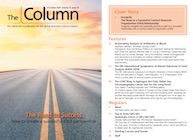Knauer Joins Industrial Sustainability Research Project
Knauer Wissenschaftliche Geräte GmbH has joined the European Union Funded IMPRESS research programme, whose goal is to advance the sustainable production of raw chemistry materials.
From September 2019, Knauer Wissenschaftliche Geräte GmbH (Berlin, Germany) has joined the European Union Funded IMPRESS research programme, whose goal is to advance the sustainable production of raw chemistry materials.
The research project, whose acronym stands for “Integration of efficient downstreaM PRocessEs for Sugars and Sugar alcohols”, is driven by a consortium of 10 member companies and research institutions receiving a total grant of 13 million euros to date.
Over the course of four years, the IMPRESS team aims to demonstrate a new kind of biorefinery, which allows converting plant-based non-food materials into important base chemicals, for example, the production of monoethylene glycol without fossil source materials. This would allow the sustainable production of in-demand polyesters.
Knauer’s role in the IMPRESS consortium is to contribute with its expertise and liquid chromatography purification technology, including the efficient continuous separation technology simulated moving bed (SMB) chromatography.
Other research areas in the project include:
- Biotechnology to break up the plant material into sugars
- The use of sustainable catalytic process technology for the creation of important base chemicals
- The development of new separation methods to purify intermediates and end products.
For more information, please visit: www.knauer.net

Regulatory Deadlines and Supply Chain Challenges Take Center Stage in Nitrosamine Discussion
April 10th 2025During an LCGC International peer exchange, Aloka Srinivasan, Mayank Bhanti, and Amber Burch discussed the regulatory deadlines and supply chain challenges that come with nitrosamine analysis.












